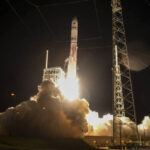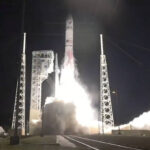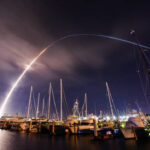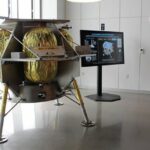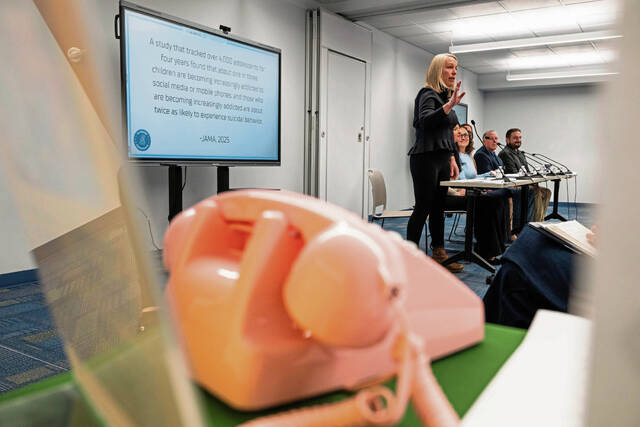Dire propulsion problems might have doomed a Pittsburgh’s company’s effort to put the first commercial lunar lander on the moon.
Hours after a successful pre-dawn launch Monday from a Florida spaceport, Astrobotic issued a grim update on the status of Peregrine, the spacecraft it is seeking to land on the moon.
An Astrobotic post on social media at 1 p.m. revealed that Peregrine’s propulsion system was failing and losing propellant. Given that the craft is having trouble moving, Astrobotic said reaching the moon appears unlikely.
“Unfortunately it appears the failure within the propulsion system is causing a critical loss of propellant,” said the company. “The team is working to try and stabilize this loss, but given the situation, we have prioritized maximizing the science and data we can capture.”
Astrobotic, which is headquartered on Pittsburgh’s North Side, is trying to become the first company to land on the moon in a commercial venture. NASA awarded $79.5 million to the company to deliver payloads to the moon.
The effort has received praise and financial support form local, state, and federal officials.
Update #4 for Peregrine Mission One: pic.twitter.com/6uISAG3Je1
— Astrobotic (@astrobotic) January 8, 2024
NASA acknowledged the challenges facing Peregrine and said there are still valuable lessons from the mission, even if it fails.
“Each success and setback are opportunities to learn and grow,” said Joel Kearns, deputy associate administrator for exploration at NASA’s Science Mission Directorate in Washington. “We will use this lesson to propel our efforts to advance science, exploration, and commercial development of the Moon.”
Earlier in the day, Peregrine was dealing with a variety of issues after successfully clearing the atmosphere on a United Launch Alliance rocket.
Peregrine blasted off aboard United Launch Alliance’s Vulcan rocket around 2:18 a.m. from Cape Canaveral, Fla.
About six hours after separating from the Vulcan rocket, Astrobotic released a statement on its social media accounts indicating that an error had occurred, preventing the company from “achieving a stable sun-pointing orientation.”
In a second statement posted shortly after 11 a.m., Astrobotic said that the “anomaly” could threaten the ability of the spacecraft to land softly on the moon.
Astrobotic managed to reorient the lander’s solar panels to aid in recharging its battery before the spacecraft entered an expected communications blackout.
Once communication was reestablished, Astrobotic began charging the lander’s battery, according to a third statement posted around 12:30 p.m. It suspects the anomaly resulted from a failure in the propulsion system.
An Update on Peregrine Mission One: pic.twitter.com/Q20dGVOMml
— Astrobotic (@astrobotic) January 8, 2024
Update #2 on Peregrine Mission One: pic.twitter.com/hS5QsAihh4
— Astrobotic (@astrobotic) January 8, 2024
Update #3 for Peregrine Mission One: pic.twitter.com/z4NK2achGG
— Astrobotic (@astrobotic) January 8, 2024
Allegheny County Executive Sara Innamorato was in Florida for the launch.
“Seeing the culmination of so many years of work of this employee-owned, Pittsburgh-based company was inspiring. The Peregrine Mission One represents one of the first U.S. lunar landings in more than 50 years,” she said. “I love that Pittsburgh is leading the way in the next era of space science, exploration and commerce.”
????I was honored to be in Florida for Astrobotic’s Peregrine Mission One successful launch this morning. Seeing the culmination of so many years of work of this employee-owned, Pittsburgh-based company was inspiring. https://t.co/UTOHqr0Nra
— Allegheny Co. Exec. (@ACE_Innamorato) January 8, 2024
Plans called for Peregrine to reach the lunar surface in February, where it would have delivered 21 payloads from NASA and other commercial entities.
The first U.S. commercial robotic launch to the Moon successfully lifted off Jan. 8 on the first flight of @ULALaunch’s #VulcanRocket. @Astrobotic’s Peregrine Mission 1 lander is expected to reach the lunar surface in February: https://t.co/csvx73ZqgP pic.twitter.com/N7Mxiqi8GC
— NASA (@NASA) January 8, 2024
The launch was initially scheduled for Christmas Eve, but was delayed because of routine issues with the ground system. The launch date was rescheduled to Monday in mid-December.
Astrobotic was founded in 2007 and operates out of a 47,000-square foot facility on North Lincoln Avenue.
Related
• Pittsburgh’s Astrobotic Technology is attempting the first U.S. moon landing since the Apollo missions a half-century ago• Astrobotic expansion could spur creation of 'space district' in Pittsburgh, officials say






